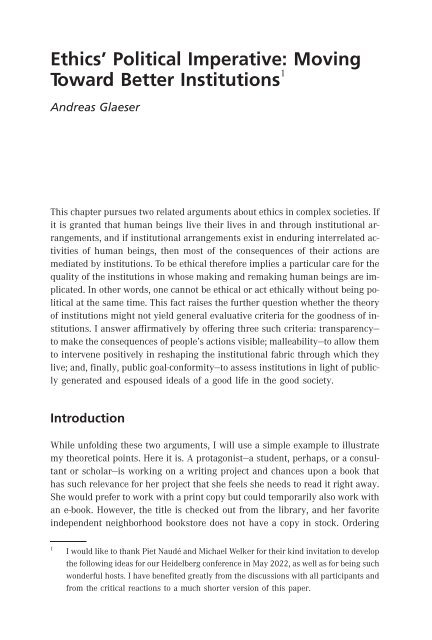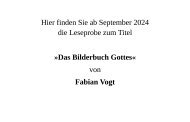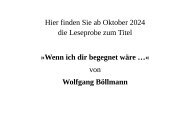Piet Naudé | Michael Welker | John Witte, Jr. (Eds.): The Impact of Political Economy (Leseprobe)
In our late modern pluralistic societies, there are tensions and complementarities between a plurality of individual and social claims and activities to shape societal life and a constructive pluralism of what is known as social systems. The latter provide normative codes and powers emanating from the areas of law, religion, the family, the market, the media, education, academic research, health care, defense and politics. A better understanding and steering of this complex division of powers is crucial for the common good and for freedom and peace. In this volume, a multi-disciplinary team of experts from Germany, Italy, Australia, the UK, the USA, and South Africa bring their conceptual, empirical and historical insights to bear in three broad sections: »The moral dimension of social systems«; »The interaction of religion, law and education with political systems«; and »The moral (mal)-formation evident in case studies on the global financial crisis and social media«.
In our late modern pluralistic societies, there are tensions and complementarities between a plurality of individual and social claims and activities to shape societal life and a constructive pluralism of what is known as social systems. The latter provide normative codes and powers emanating from the areas of law, religion, the family, the market, the media, education, academic research, health care, defense and politics. A better understanding and steering of this complex division of powers is crucial for the common good and for freedom and peace.
In this volume, a multi-disciplinary team of experts from Germany, Italy, Australia, the UK, the USA, and South Africa bring their conceptual, empirical and historical insights to bear in three broad sections: »The moral dimension of social systems«; »The interaction of religion, law and education with political systems«; and »The moral (mal)-formation evident in case studies on the global financial crisis and social media«.
Create successful ePaper yourself
Turn your PDF publications into a flip-book with our unique Google optimized e-Paper software.
Ethics’ <strong>Political</strong> Imperative: Moving<br />
Toward Better Institutions 1<br />
Andreas Glaeser<br />
This chapter pursues two related arguments about ethics in complexsocieties. If<br />
it is granted that human beings live their lives in and through institutional arrangements,<br />
and if institutional arrangements exist in enduring interrelated activities<br />
<strong>of</strong> human beings, then most <strong>of</strong> the consequences <strong>of</strong> their actions are<br />
mediated by institutions. To be ethical therefore implies aparticular care for the<br />
quality <strong>of</strong> the institutions in whose making and remakinghuman beings are implicated.<br />
Inother words, one cannot beethical or act ethically without being political<br />
at the same time. This fact raises the further question whether the theory<br />
<strong>of</strong> institutions might not yield general evaluative criteria for the goodness <strong>of</strong> institutions.<br />
Ianswer affirmatively by <strong>of</strong>fering three such criteria: transparency—<br />
to make the consequences <strong>of</strong> people’sactions visible; malleability—to allow them<br />
to intervene positively in reshaping the institutional fabric through which they<br />
live; and, finally, public goal-conformity—to assessinstitutions in light <strong>of</strong> publicly<br />
generated and espoused ideals <strong>of</strong> agood life in the good society.<br />
Introduction<br />
While unfolding these two arguments, Iwill use asimple example to illustrate<br />
my theoretical points. Here it is. Aprotagonist—a student, perhaps, or aconsultant<br />
or scholar—is working on awriting project and chances upon abook that<br />
has such relevance for her project that she feels she needs to read it right away.<br />
She would prefer to work with aprint copy but could temporarily also work with<br />
an e-book. However, the title is checked out from the library, and her favorite<br />
independent neighborhood bookstore does not have acopy in stock. Ordering<br />
1<br />
Iwould like to thank <strong>Piet</strong> <strong>Naudé</strong> and <strong>Michael</strong> <strong>Welker</strong> for their kind invitation to develop<br />
the following ideas for our Heidelberg conference in May 2022, as well as for being such<br />
wonderful hosts. Ihave benefited greatly from the discussions with all participants and<br />
from the critical reactions to amuch shorter version <strong>of</strong> this paper.
















